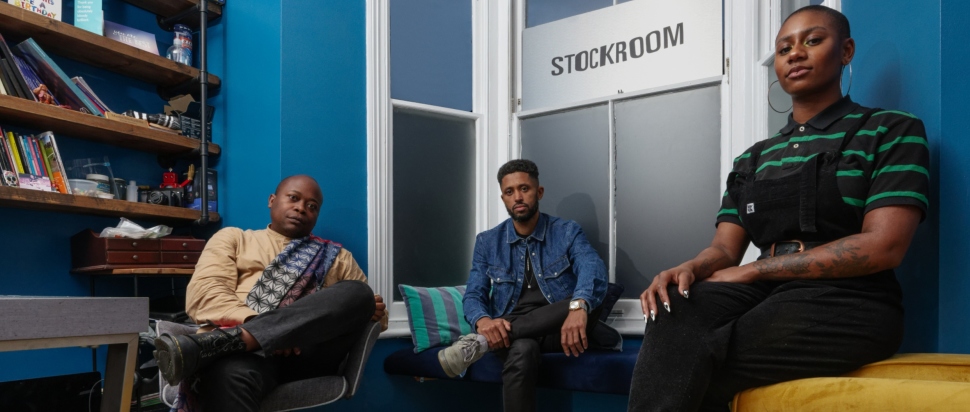Tonderai Munyevu on Black British life, and post-pandemic grief
"COVID didn't discriminate, society did this for us". Tonderai Munyevu's piece in Blaccine: First Dose explores vaccine hesitancy and Black Britishness
Tonderai Munyevu hadn't spent much time in Brixton prior to 2022. His first visit coincided with a four-week research trip. It was a process, by his admission, that did not go as expected. "I thought it was just going to be a very simple play about the misunderstanding of the Black community,” he tells me, recounting how the inspiration for the play came from a Guardian article published in 2021 citing low levels of vaccine uptake in the Black community. “I just thought that was really appropriate, and that would just debunk this fact. And it really was quite confronting, then, seeing different stories begin to emerge.”
Those stories lie at the heart of Blaccine: First Dose, a three-part audio drama and stage production that will premiere via Pitlochry Festival Theatre this month. The play is made up of three monologues – Process by Maheni Arthur, Trigger Warning by Tonderai Munyevu and Brixton Royalty by Isaac Tomiczek. The series will be presented as both a stage and audio production, exploring the question of what it means to be Black in Britain during a global health crisis.
At its heart, Blaccine offers us a nuanced and sensitive portrayal of the lines between historical white violence and present-day vaccine hesitancy. The complexity of this interplay is, as Munyevu suggests, crucial for the audience to grasp.
“We want them to see Black people as heroic, because we are not out for revenge. We are out for understanding and equality. So actually, when you see a Black person, there's a level of trauma that they are carrying. And in my experience, it's often carried very well, and it's often really an effort to not continue or perpetuate these horrible things that have happened to us. That's why I think Black joy is so important.”
While witty nods to rogue barbers and the Dulwich buggy brigade offer crucial moments of joy, Blaccine does not shy away from the sting of post-pandemic pain. The fear of bodies being bound to the whims of powers much bigger than us – and the loss that comes when places that were so familiar change – resurface repeatedly over each of the monologues. It was the universality of this loss that became a way to talk to the communities in Brixton, who, as Tonderai is keen to explain, “were really reeling from what had happened to them.”
One interaction in particular is seared in his mind. “A man... wanted to talk to us about his experience, how Brixton market was being taken over, what the ramifications really were for him personally. A touch of that story was sharing his history of being from the Caribbean, but also feeling like he couldn't go and have his leg fixed in the UK on the NHS, because nobody was listening to him. And in that moment, it encapsulated all of what I think this project is about: the unheard story. When somebody finds you to tell you something and you think, 'If we weren't doing this project, this man would not be talking about this.'”
These conversations, Munyevu says, have continued to have a profound impact months after the end of the writing process. “I realised that there was this privilege I had coming to the UK from Zimbabwe. If someone were to say, 'Go back home,' I could say, 'Yeah, don’t get it twisted, I could, but I am choosing to stay,'” he laughs. “That gave me protection. But now it’s time to say I am part of this landscape, and it’s not this monolithic experience of Blackness. And I’ve realised that I am only as okay as the most vulnerable Black British person.”
Though he's a self-defined pragmatist, Munyevu is concerned about the evaporation of a collective solidarity that emerged in the wake of the COVID-19 pandemic and the murder of George Floyd. “The world seems to have come back harsher,” he reflects. It is this sense of togetherness that Munyevu hopes will be re-captured when Blaccine premieres in the new year.
“One thing I really think is beautiful about this piece is this isn't a work just for Black people. There is that space for Black people to come be seen and heard, but this is a play about how we emerge from grief. Everyone is coming to terms with the grief of the pandemic, and with the grief of COVID. Everybody knows somebody who left this Earth. The language around the pandemic doesn’t have space for that grief. It doesn’t have a space for loss, and then for rediscovery of joy as well. I think we need that.”
Blaccine: First Dose, online via Pitlochry Festival Theatre, 12, 19, & 26 Jan, 7pm – tickets here
